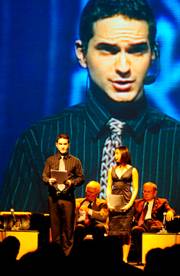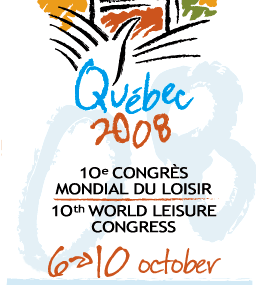
[Proclamation of the Québec Declaration]
[Québec Declaration]
|
Proclamation of the Québec Declaration1 |
 The 10th World Leisure Congress ended on the morning of October 10th with the proclamation of the Québec Declaration, adopted beforehand by the World Leisure Organization and several of the event's partners. The proclamation was made by two young students in the field of leisure and in the presence of Mr. Michel Beauregard, President of the Congress, Mr. Jean-Paul L'Allier, Honorary Chairman, Mr. Christopher R. Edgington and Derek Casey, respectively Secretary General and President of the World Leisure Organization, Mr. Régis Labaume, mayor of Québec City, Mr. André Thibault, President of the program committee, Mr. Lee Kwang-jun, mayor of ChunCheon, and Son Eun-nam, President of the World Leisure Congress 2010.
The 10th World Leisure Congress ended on the morning of October 10th with the proclamation of the Québec Declaration, adopted beforehand by the World Leisure Organization and several of the event's partners. The proclamation was made by two young students in the field of leisure and in the presence of Mr. Michel Beauregard, President of the Congress, Mr. Jean-Paul L'Allier, Honorary Chairman, Mr. Christopher R. Edgington and Derek Casey, respectively Secretary General and President of the World Leisure Organization, Mr. Régis Labaume, mayor of Québec City, Mr. André Thibault, President of the program committee, Mr. Lee Kwang-jun, mayor of ChunCheon, and Son Eun-nam, President of the World Leisure Congress 2010.
"We have every reason to be pleased that over 4,000 people from nearly 60 countries came together to proclaim this official declaration affirming that leisure has a positive and essential impact on the quality of life of individuals, communities and society and that they have solemnly committed to the application of its principles for the common good," rejoiced Michel Beauregard.

Québec Declaration
Leisure, Essential to Community Development
Introduction
From October 6th to 10th, 2008, in Québec City, Canada, during the 10th World Leisure Congress, delegates from over seventy countries gathered to discuss leisure as a determining factor in the sustainable development of communities.
For this debate, the term ‘community’ is used to describe a group of people who share common interests, a history, and an organization in which they participate and for which they show solidarity.
In the context of free time, the term ‘leisure’ is characterised as perceived freedom, experienced through a variety of social, cultural, sport and tourism activities in which the individual is the main actor.
Delegates have examined the status of leisure in communities all over the world and questioned its relation with the affirmation of identity and growth in solidarity, social relations and diversity within a community. They discussed leisure as a public space as well as a place for individual involvement, public awareness of collective issues and a rationale of civil society. Finally, they examined leisure's role as an influencing factor in the well-being of individuals and communities.
At the end of these discussions, delegates adopted the following declaration.
Art.1 - Quality of life and well-being of individuals and communities.
Whereas
- According to the World Health Organization, the quality of life and health of individuals rests on their physical, psychological and social ability to interact in their environment and to perform the roles they have chosen in an acceptable fashion for themselves and for the groups to which they belong;
- The quality of life of groups and communities rests on common values of association, accessibility, diversity, safety, information and freedom of speech.
Whereas leisure
- Is a right recognized by the United Nations1 and is characterized by
- A free personal or group quest for satisfaction, pleasure, discovery and socialisation in a leisurely fashion;
- Experiences of well-being and harmony with oneself, others and nature;
- Healthy lifestyles directly related to the physical and social well-being of individuals and communities;
- The effects of cultural, social, and economical development on society as described in the World Leisure Organization's Charter of Leisure2;
- Accessibility by the greatest number of people.
In relation thereto:
Leisure contributes to the quality of life and well-being of individuals and their communities as well as cultural, economical and cultural development.
Art.2 - Communities' social capital.
Whereas
- Personal freedom and choice are the central elements of leisure;
- Communities that succeed socially, culturally and economically are recognized by their enhanced awareness of common issues, their sense of working together and a social capital based on a high level of social and public participation, trust and reciprocity amongst its members.
Whereas leisure
- Is an important place for social and voluntary involvement, as well as the expression of solidarity and a sense of belonging;
- Contributes to the emergence and maintenance of multiple social groups and a network of associations and group partnerships;
- Represents a place for public gathering and the building of social relationships beyond the functional connections of work and community diversity.
In relation thereto:
Leisure contributes to the social capital development of communities.
Art.3 - Democratic life.
Whereas
- Democratic life means jointly making decisions which ensure the growth of individuals and the development of common welfare and relationships with and notwithstanding the context of social, cultural, economical and political diversity.
Whereas leisure
- Mobilizes thousands of citizens of all generations and origins who work together for its implementation and thus take charge of their community's development;
- Corresponds to the culture, the history, and the resources of a community;
- Constantly requires making decisions regarding the allocation of resources and the harmonization of a community’s practices in the context of sustainable development.
In relation thereto:
Leisure, a setting to learn and practice public participation, contributes to democratic life.
Art.4 - General Declaration.
Leisure plays an essential role in community development: it affects the quality of life and the well-being of individuals, contributes to the development of social ties and social capital, and represents a place for expression and engagement in democratic life.
Art.5 - Commitment.
Whereas leisure can only contribute to community development under certain conditions, delegates, insofar as their personal capabilities will allow, agree to:
- Support and develop voluntary involvement of citizens in their communities;
- Support and develop leisure organizations and associations;
- Increase accessibility, diversity, creativity and safety for the leisure experience;
- Ensure the democratic status and governance in the organization of leisure;
- Respect the ways of life and cultural diversity of local groups and communities;
- Promote and distribute the declaration herewith.
Québec City, Canada, October 10th, 2008.
1 Universal declaration on Human Rights (1948), Article 24; Convention on the Rights of the Child (1989), Principle 7; The Convention on the Elimination of All Forms of Discrimination against Women (1979l), article 13; United Nations Principles for Older Persons (1991).
2 World Leisure Organisation (2000). Original version adopted by the International Recreation Association in 1970 and revised by its successor the World Leisure and Recreation Association in 1979 becoming the World Leisure Organisation in 2007.








